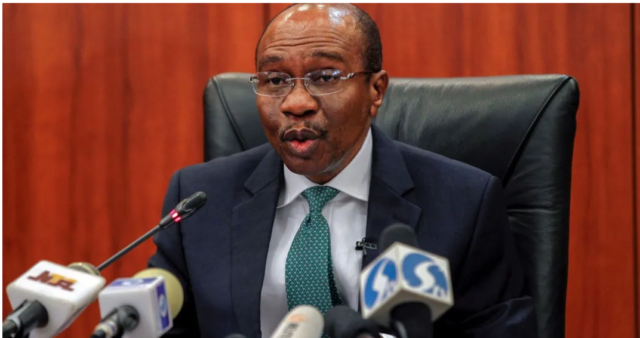A prosecution witness, Edward Adamu, on Wednesday, testified at the Federal Capital Territory (FCT) High Court in Abuja that former Central Bank of Nigeria (CBN) Governor Godwin Emefiele bypassed required approvals from the Nigerian president and the CBN Board for the redesign of naira notes in late 2022.
Mr Adamu, a former deputy governor at the CBN, appeared as the fourth prosecution witness in the trial of Mr Emefeie, who is being prosecuted by the Economic and Financial Crimes Commission (EFCC) on charges of illegal printing of naira.
Led in evidence by EFCC’s prosecuting counsel, Rotimi Oyedepo, a Senior Advocate of Nigeria (SAN), the witness detailed how the naira redesign process was carried out in disregard for the bank’s standard procedures.
According to Mr Adamu, the typical process involves the Director of Currency Operations submitting a proposal, which is first reviewed by the Committee of Governors (COG) and then forwarded to the CBN Board for approval. Only after these steps is presidential approval sought.
In this instance, Mr Adamu said Mr Emefiele bypassed both the Board and much of the formal process, convening a meeting of the COG in October 2022, where he presented what he claimed to be an already secured presidential approval for the redesign.
“I became aware of it in October 2022 when the governor informed us, the deputy governors, that he had gotten an express approval to redesign the currency. Then, on the 26th of October 2022, we were formally informed of the presidential approval of the redesign, so that is what happened in October; then, there was a formal announcement of the currency redesign,” Mr Adamu was quoted as saying in a statement by EFCC’s spokesperson, Dele Oyewale, on Wednesday.
The witness added, “At the meeting, the governor showed us the approval of the president, by showing us the page where the approval of the president is.
“Subsequently, there was a board meeting of the board of directors, where we were also informed of the presidential approval of the currency redesign.”
Mr Adamu noted that the final designs for the naira notes—which affected the N200, N500, and N1,000 denominations—differed from the original concepts that had been discussed, indicating that Emefiele had unilaterally made changes.
Under cross-examination by the defence lawyer, Olalekan Ojo, a SAN, Mr Adamu was asked whether it was common practice for presidential approval to be obtained before the CBN Board was consulted.
He replied that during his tenure at CBN, such actions were not typical.
After the cross-examination, the trial judge, Maryanne Anenih, adjourned proceedings until 17 October.
Among other charges, the EFCC accused him of printing N684 million notes at the cost N18.96 billion without then President Muhammadu Buhari’s approval.
The EFCC claimed that between October 2022 and March 2023, Mr Emefiele illegally approved the printing of currency—specifically the N1,000, N500, and N200 denominations—without securing approvals mandated by law.
EFCC said that the process cost the nation billions and breached Section 19 of the CBN Act, 2007, which requires Board and presidential consent for currency changes.
Also, the agency accused the former CBN governor of illegally approving the withdrawal of about N124.8 billion from the consolidated revenue fund.
Mr Emefiele has faced multiple corruption charges in Lagos and Abuja since he was removed from office by President Bola Tinubu in June 2023.
Naira redesign saga
The unpopular naira redesign policy remains a major highlight of the twilight of then President Buhari’s administration.
It led to a severe shortage of naira notes, bringing pains to many Nigerians in the first two months of 2023.
Mr Emefiele and Mr Buhari adamantly continued implementing the policy even as it triggered chaos and widespread disruption amid preparations for the 2023 general elections. They touted the policy as a means of stopping vote buying during the elections.
But despite the policy being in force, cases of vote buying were recorded during the 25 February 2023 presidential and National Assembly elections.
Mr Buhari staunchly defended the policy to the extent of ignoring an interim order of the Supreme Court suspending its implementation. On 8 February 2023, the Supreme Court ordered that both the old notes and their newly designed versions should remain legal tender pending further hearings in the suit. But in violation of the court’s order, Mr Buhari, in a broadcast on 16 February, restored the validity of the old N200 notes and insisted that the old N500 and N1,000 banknotes had ceased to be valid.
The case was finally laid to rest when the Supreme Court gave its final judgement on 3 March 2023 nullified Mr Buhari’s directive withdrawing the old naira notes and extended their validity till 31 March. The Supreme Court also adjudged Mr Buhari a disobeyer of court order, citing his violation of its earlier interim order suspending the implementation of the naira redesign policy.







